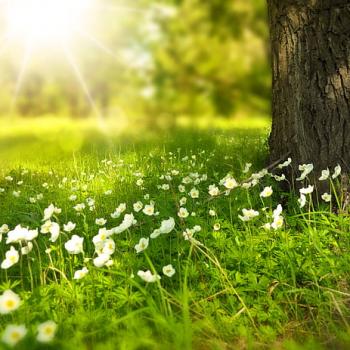by Gregory
When someone asks you to explain your spirituality, where do you start? How do you put into words your worldview, your sense of God, your core values and convictions?
It’s not easy, for sure.
My tendency is to begin offering theological and philosophical insights, to launch into metaphysics or questions of existentialism. This is not what most people are after when they ask about your spirituality. Sure, these issues matter to the answer, but they aren’t the crux of the matter.
I’m learning.
When I try to answer this question, I now start with my experience of the Sacred.
I feel a Sacred Presence in the world. I experience it through nature, in my love for others, and in the hard to come by silent moments of stillness that punctuate the day if one lets them.
By sacred I mean that which deserves my attention (my worship, my allegiance?) – that which addresses me as a person and relates to my deepest existential concerns and that which resides at the heart of reality.
(I have struggled expressing my exact theological concepts that help explain – for some – what I mean by this Sacred Presence. These ideas are too complicated to launch into right now, but my thinking on God is often vague, veers away from personalized deity, and is envisioned as entwined and enmeshed within nature and each human soul.)
I then move on to explain that I believe that this Sacred Presence is also the ground of my deepest held values and moral convictions – it is the source of justice, love, kindness, truth, and so on. This presence not only manifests itself, but it makes demands, calls, and asks me to dispose of myself according to a vision of rightness and truth.
Finally, in the presence of the sacred, I feel connected and grounded, I feel my place in the cosmos, and I feel the unity of being interconnected with everyone and everything else as well.
In the presence of the sacred, I feel natural impulses to express myself, to utter the deeper contents of my heart – to align myself through words, images, music, poetry, art, and sentiment with the presence. These impulses are part of the motivations that fuel worship and prayer. Liturgy and ritual are their natural genres and contexts.
Therefore, despite being someone who tends towards a rationalist and naturalist interpretation of the world, there remains an experiential and near-mystical reality to my spiritual experience.
I grant that the above is vague, or at least sounds vague and fuzzy. As I said in the beginning, it can be quite difficult to put our spiritual experience into words. It is certainly real.
I understand religious practice as a system that structures the above and offers it theoretical meaning and practical outlet.
It is the above experience of the world that causes me to want to be religious, to engage in prayer and ritual, and to engage with others in conversation and community revolving around these things.
Speaking only for myself, it is not enough to simply take walks in outdoor settings and spend time in nature. While this can be powerful, I also want words and ritual to express myself and address the Sacred.
Given that so much of my spiritual experience is rooted in nature and the unfolding of the seasons, one would think that one of the various forms of pagan, Neopagan and nature-based spiritual traditions would be an ideal “spiritual home base”.
I’ve sincerely engaged many of the above pagan traditions, but none have “worked” in the full sense of the term. While I do find beauty and meaning there, I am not at home with some of the movement’s general trends and practices. I am not a polytheist, I am not a hard theist, and I can’t relate to most approaches to magic. I appreciate the emphasis on ritual, and ritual flexibility, but I also find it arduous to craft all of one’s rituals as well as provide the full theoretical foundations from which they arise and in which they are grounded.
Those who walk a neopagan path have my admiration and spiritual kinship. In most circumstances, I feel comfortable with the general directions they take. I appreciate how they spend considerable amounts of time crafting meaningful rituals. Yet at the end of the day, the end results are not a religion that suits my needs – at least at present.
Out of all the spiritual traditions I have explored and engaged – Judaism has taken root in my soul. Granted, my Celtic-inclined soil is not the natural home for Semitic roots, but with patient grafting and cultivation, Judaism has become increasingly the spiritual tradition that allows the fullest expression of my spirituality – it helps me best align with the Sacred.
Why Judaism? I cannot fully answer that question, because I know, deep within me, something has called me to this path for the time being and going forward. When I contemplate leaving and walking another path, the calling becomes louder, and visits me in my dreams, my meditations, and my unconscious inclinations.
I remain captivated by the beauty of Judaism – its simplicity, its richness, its wholeness. The culture that comes with it doesn’t always speak to this Germanic-Celtic soul, but the fundamental religious vision of Covenant with the Source of goodness, life, and love does.
I’m learning to make it my own as well. Judaism encourages personalization, it makes room for innovation. My prayer life, my worship, my understandings of the Divine, even my theology aligns with the broader Jewish vision of justice and love, rightness and healing for the world.
Judaism is a religion of wine, candles, bread, and blessings. Hebrew is indeed a Sacred tongue. The values of Judaism resonate with me as none other do. And Seders have become my primary way of celebrating the seasons and marking time in nature.
That’s my short answer to how I would explain my spirituality – it’s a progressive, Jewish, nature-based approach to aligning myself to the Sacred presence I find in the world.
How would you explain your spiritual impulses?















